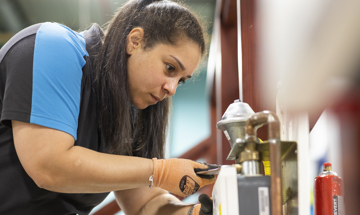More than a third of homeowners have risked their safety by carrying out a DIY task that should have been done by a professional.
A study of 2,000 homeowners found a third (32 per cent) have fiddled with the gas fire, 35 per cent have tried to fix the boiler and 40 per cent have played about with the fuse box.
Three in 10 have got a DIY job wrong and been forced to call in a professional to correct it – with a fifth (21 per cent) having bungled the job so badly that it cost more for the professional to fix it than they would have charged to do it in the first place.
The research was carried out by British Gas ahead of Gas Safety Week this week, and found that a worrying number of homeowners are willing to try out complex work around the house, relying on YouTube tutorials for instructions.
Almost one in 10 say they'd try to remove asbestos with the help of a YouTube video, while seven per cent would go as far as to try and install a boiler or fix a gas fire, despite it taking years for gas safe engineers to qualify.
"As a nation, we love to get our hands dirty and take part in some good old-fashioned DIY. But it’s important to know when to stop. Gas appliances in particular can become dangerous if poorly maintained, and carrying out the maintenance can be dangerous in itself. That’s why getting professional help with gas appliances is absolutely the right thing to do. It’s worrying that one in ten respondents to our survey admitted that they’ve never checked if the gas engineer they’re using is properly qualified – a vital step before having work done around the house."
Four in 10 of those surveyed admitted they take the approach that if a tradesperson can do something, they can teach themselves how to do it.
But almost a third (31 per cent) of respondents have had an electric shock while doing DIY, while 58 per cent have injured themselves in other ways with splinters, cuts and burns.
38 per cent have looked back at a DIY job and thought 'I should not have done that'.
And similar figure (40 per cent) admit they have unfinished DIY jobs in the home because they didn't have the skills to complete them in the end.
British Gas carried out the research not just to highlight the importance of using tradespeople, but also of monitoring gas appliances for tell-tale signs of dangerous faults.
Half of adults don’t know that a yellow flame on the cooker or boiler is a warning sign to look out for, with 45 per cent not realising that the same applies to the pilot light on the boiler going out.
Four in ten (42 per cent) don’t know to watch out for black soot marks on a gas appliance, and a nearly a fifth (23%) wouldn’t even raise the alarm if they could smell gas.
That’s why British Gas is urging people to have carbon monoxide detectors in their homes, to alert them to any gas leaks before they become serious.
29 per cent of respondents to the OnePoll survey said they don't have a carbon monoxide monitor. And those who have got one typically haven’t tested it for three months.
For more information, visit the British Gas website.
"Carbon monoxide poisoning is a silent killer that can easily be prevented with some simple measures. Gas Safety Week is a great opportunity to remind everyone of the importance of annual safety checks, raise awareness of the warning signs to look out for on gas appliances and the difference a carbon monoxide alarm can make."
Rob Topping, Safety Assurance Engineer

News
Centrica acquires owner of leading digital platform, Ignition
Tech & Innovation

News
British Gas to Boost its Workforce with 300 New Apprentices
Our people

News
British Gas increases support for prepayment customers this winter
Customer service

News
Centrica signs strategic partnership with ENSEK
Tech & Innovation

News
British Gas support for vulnerable customers - winter 2021/22
Smart Homes

News
Centrica boosts flexible working for contact centre staff
Our people
